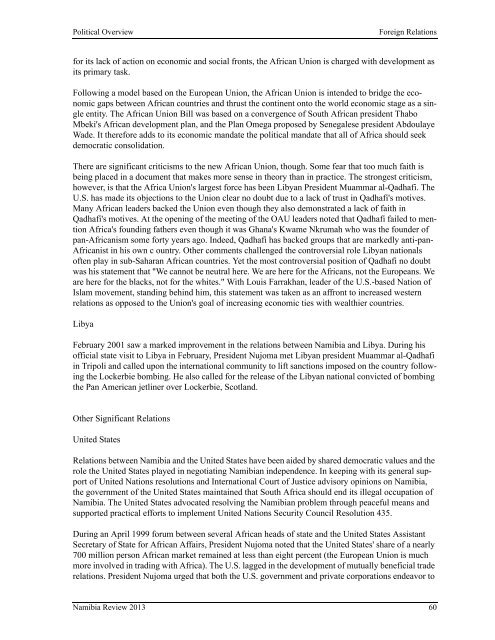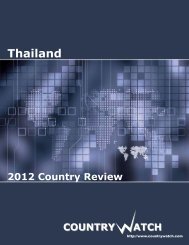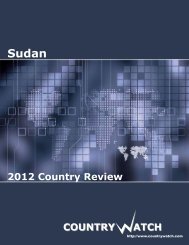Namibia - CountryWatch
Namibia - CountryWatch
Namibia - CountryWatch
You also want an ePaper? Increase the reach of your titles
YUMPU automatically turns print PDFs into web optimized ePapers that Google loves.
Political Overview Foreign Relations<br />
for its lack of action on economic and social fronts, the African Union is charged with development as<br />
its primary task.<br />
Following a model based on the European Union, the African Union is intended to bridge the economic<br />
gaps between African countries and thrust the continent onto the world economic stage as a single<br />
entity. The African Union Bill was based on a convergence of South African president Thabo<br />
Mbeki's African development plan, and the Plan Omega proposed by Senegalese president Abdoulaye<br />
Wade. It therefore adds to its economic mandate the political mandate that all of Africa should seek<br />
democratic consolidation.<br />
There are significant criticisms to the new African Union, though. Some fear that too much faith is<br />
being placed in a document that makes more sense in theory than in practice. The strongest criticism,<br />
however, is that the Africa Union's largest force has been Libyan President Muammar al-Qadhafi. The<br />
U.S. has made its objections to the Union clear no doubt due to a lack of trust in Qadhafi's motives.<br />
Many African leaders backed the Union even though they also demonstrated a lack of faith in<br />
Qadhafi's motives. At the opening of the meeting of the OAU leaders noted that Qadhafi failed to mention<br />
Africa's founding fathers even though it was Ghana's Kwame Nkrumah who was the founder of<br />
pan-Africanism some forty years ago. Indeed, Qadhafi has backed groups that are markedly anti-pan-<br />
Africanist in his own c ountry. Other comments challenged the controversial role Libyan nationals<br />
often play in sub-Saharan African countries. Yet the most controversial position of Qadhafi no doubt<br />
was his statement that "We cannot be neutral here. We are here for the Africans, not the Europeans. We<br />
are here for the blacks, not for the whites." With Louis Farrakhan, leader of the U.S.-based Nation of<br />
Islam movement, standing behind him, this statement was taken as an affront to increased western<br />
relations as opposed to the Union's goal of increasing economic ties with wealthier countries.<br />
Libya<br />
February 2001 saw a marked improvement in the relations between <strong>Namibia</strong> and Libya. During his<br />
official state visit to Libya in February, President Nujoma met Libyan president Muammar al-Qadhafi<br />
in Tripoli and called upon the international community to lift sanctions imposed on the country following<br />
the Lockerbie bombing. He also called for the release of the Libyan national convicted of bombing<br />
the Pan American jetliner over Lockerbie, Scotland.<br />
Other Significant Relations<br />
United States<br />
Relations between <strong>Namibia</strong> and the United States have been aided by shared democratic values and the<br />
role the United States played in negotiating <strong>Namibia</strong>n independence. In keeping with its general support<br />
of United Nations resolutions and International Court of Justice advisory opinions on <strong>Namibia</strong>,<br />
the government of the United States maintained that South Africa should end its illegal occupation of<br />
<strong>Namibia</strong>. The United States advocated resolving the <strong>Namibia</strong>n problem through peaceful means and<br />
supported practical efforts to implement United Nations Security Council Resolution 435.<br />
During an April 1999 forum between several African heads of state and the United States Assistant<br />
Secretary of State for African Affairs, President Nujoma noted that the United States' share of a nearly<br />
700 million person African market remained at less than eight percent (the European Union is much<br />
more involved in trading with Africa). The U.S. lagged in the development of mutually beneficial trade<br />
relations. President Nujoma urged that both the U.S. government and private corporations endeavor to<br />
<strong>Namibia</strong> Review 2013 60




